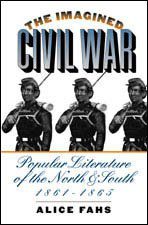Now there may be those who would save me all trouble by the assertion that there has been no real poetry produced during the war. I hope to convince you that there has been a great deal of good readable verse, and some genuine poetry written during the past four years, under the inspiration of the times through which we have passed.--Oliver Wendell Holmes, "The Poetry of the War," 1865
a little-known and fascinating side of the Civil War - the outpouring of popular literature inspired by the conflict. From 1861 to 1865, authors and publishers in both the North and the South produced a remarkable variety of war-related compositions, including poems, songs, children's stories, romances, novels, histories, and even humorous pieces. Fahs mines these rich but long-neglected resources to recover the diversity of the war's political and social meanings.
Instead of narrowly portraying the Civil War as a clash between two great, white armies, popular literature offered a wide range of representations through which to consider the conflict, as Fahs demonstrates. Works that explored the war's devastating impact on white women's lives, for example, proclaimed the importance of their experiences on the home front, while popular writings that celebrated black manhood and heroism in the wake of emancipation helped readers begin to imagine new roles for blacks in American life. By providing subjects and characters with which a broad spectrum of people could identify, popular literature invited ordinary Americans to envision themselves as active participants in the war and helped shape new modes of imagining the relationships of diverse individuals to the nation.
Civil War History 47.4 (2001) 351-353
Book Review
The Imagined Civil War:
Popular Literature of the North & South,
The Imagined Civil War: Popular Literature of the North & South, 1861-1865. By Alice Fahs. (Chapel Hill: University of North Carolina Press, 2001. Pp. xi, 410. $39.95.)
For years, the literature of the Civil War era has received a second-class status. Scholars found little that was inspiring or noteworthy in the vast outpouring of cheap novels, magazine short stories, and sentimental poetry that held the attention of the American reading public in these years. Indeed, in 1973, literary historian Daniel Aaron claimed that the Civil War was an "unwritten war" because of the absence of any great literary accomplishments.
Alice Fahs has set out to redeem this seemingly mediocre body of writing from the bin of historical obscurity. Not that she intends to find any literary masterpieces amidst the reams of wartime publications. She does intend to show us, however, how much insight can be gained about Northern and Southern attitudes toward the war, how people confronted a wide array of issues raised by the conflict, and how this literary outpouring spoke to ordinary peoples' real concerns. She hopes, too, to suggest that a distinctive sense of nationalism emerged in this literature, one that gave more room for individualized expressions of patriotism. Fahs succeeds on all these counts.
From the outset, Fahs makes clear that a certain sectional imbalance must, of necessity, influence her analysis. As she explains in her initial chapter, the South continually faced hindrances to publishing that the North did not. Lacking printing supplies as well as money, the South was never able to compete fully with the North in creating an extensive literary marketplace. This in itself, she notes, was a reflection of some of the sectional differences that had initiated the conflict. Fahs is generally successful in surmounting the obstacles posed by such imbalance. She usually manages to draw telling contrasts between the literature of the two sections, thereby mining effectively those Southern sources that were available.
Fahs goes on to survey a wide array of literary genres and themes that were prevalent in the literature of the Civil War period. She examines the sentimental stories of soldier suffering, the sensationalist tales of wartime adventure, the many stories that dealt with black experiences, as well as works of humor, history, and juvenile interest. Her book is filled with rich insights about how this literature reflected Americans' changing concerns about race, gender, political conflict, and national allegiance. Some of her most valuable observations in this regard concern tales dealing with women and African Americans. In both the North and South, the issue of race was clearly a foremost preoccupation, seen in the many stories that featured African American characters. While the proslavery bent of the South's literature seems unsurprising, Fahs's discovery of the more positive features of the North's race-conscious literature is especially noteworthy. African Americans figured prominently as independent actors in Northern wartime dramas and by 1864 were celebrated for their heroism and citizenship. Although the premature death of black actors placed limits on Northern readers' acceptance of full African American participation in national life, the literature nonetheless evoked a popular democratic impulse that, albeit tentatively, acknowledged black personhood.
Throughout the book, Fahs also calls attention to the centrality of gender in Civil War literature. When mothers allowed their sons to go fight, or when the dying soldier turned his thoughts to the women at home, female emotions served to validate men's wartime contributions; at times, in fact, Union literature placed women's emotional sacrifices on a par with men's heroism. Moreover, in the sensational tales of adventure, women might become even more active heroines, defending the flag at the point of...
